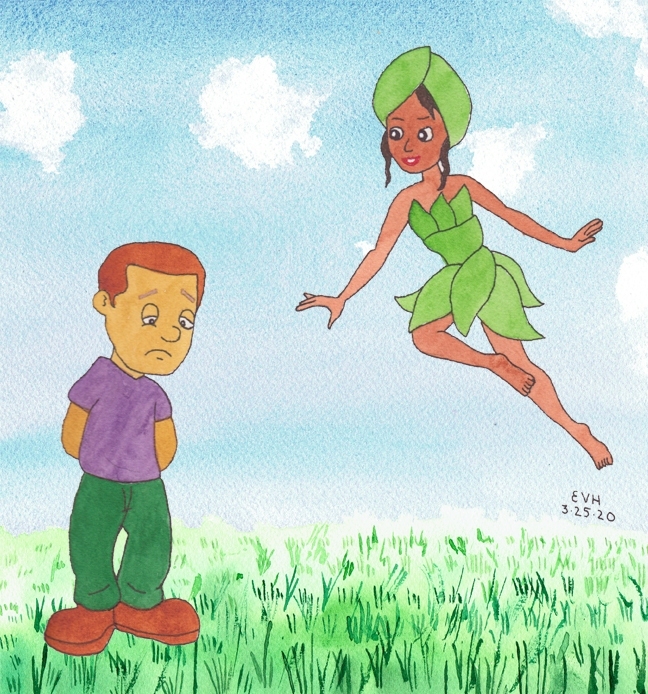
Jataka 234
Asitābhū Jātaka
The Story of Asitābhū
as told by Eric Van Horn
originally translated by William Henry Denham Rouse, Cambridge University
originally edited by Professor Edward Byles Cowell, Cambridge University
This story might be subtitled, “If you chase after a fantasy, you might miss the jewel that is right in front of your eyes.” This is a lovely story about a woman who plays right past her ignorant husband’s mistreatment to attain awakening.
“Now desire has gone.” The Master told this story while he was staying at Jetavana. It is about a young girl.
Tradition tells us that a certain man at Sāvatthi, a servant of the Master’s two chief disciples, had a beautiful and happy daughter. When she grew up, she married into a family as good as her own. But the husband, without consulting anybody, used to enjoy himself elsewhere at his own sweet will. She took no notice of his disrespect but invited the two chief disciples into her home. She gave them gifts and listened to their teaching until at last she attained stream-entry. After this she spent all of her time in the enjoyment of the Path and the Fruit. Finally, thinking that since her husband did not want her, there was no need for her to remain in the household life. She determined to embrace the holy life. She informed her parents of her plan, carried it out, and became an arahant.
Her story became known among the Saṇgha. One day they were discussing it in the Dharma Hall. “Friend, the daughter of this family strove to attain the highest good. Finding that her husband did not care for her, she gave rich presents to the chief disciples, listened to their teaching, and gained stream-entry. She took leave of her parents, became a bhikkhunī (a Buddhist nun), and then an arahant. So, friend, the girl sought the highest good.”
While they were talking, the Master came in and asked what they were discussing. They told him. He said, “This is not the first time, monks, that she seeks the highest. She did so in past days as well.” And he told them this story from the past.
Once upon a time, when Brahmadatta was the King of Benares, the Bodhisatta was living as a recluse in the Himalaya Mountains. He had cultivated the Faculties (1. walking on water or through walls, 2. ESP, 3. telepathy, 4. recollecting previous lives and 5. “the divine eye,” which is seeing peoples’ next rebirth) and the Attainments (jhānas).
The King of Benares saw how magnificent the pomp of his son Prince Brahmadatta was. The King was filled with suspicion, and he banished his son from the realm.
The young man with his wife Asitābhū made his way to the Himalayas. He lived in a hut of leaves. They had fish and all manner of wild fruits to eat. He saw a woodland fairy and became enamored with her. "I will take her to be my wife!” he said. And thinking nothing of Asitābhū, he chased after the fairy.
His wife, seeing that he was chasing after the sprite, was angry. “The man cares nothing for me,” she thought. “Why should I have anything to do with him?”
So she went to the Bodhisatta and showed him great respect. She learned what she must do in order to ordain. She gazed at the mystic object. She developed the Faculties and the Attainments. Then she bade the Bodhisatta farewell and returned to stand by the door of her hut of leaves.
Now Brahmadatta had followed the fairy but did not see which way she went. So robbed of his desire he set back to the hut. Asitābhū saw him coming. She rose up in the air and hung in the air the color of a precious stone. She said to him, “My young lord! It is through you that I have attained this ecstatic bliss!” and she uttered the first stanza:
“Now desire has gone,
Thanks to you, and found its ending,
Like a tusk, once sawn,
None can make it one by mending.”

Figure: “I have attained this ecstatic bliss!”
Then, as he looked on, she rose up and flew away to another place. And when she had gone, he uttered the second stanza, lamenting:
“Greed that knows no stay,
Lust, the senses all confusing,
Steals our good away,
Even as now my wife I’m losing.”
And having shown his misery in this stanza, he lived alone in the forest, and when his father died, he became King.
After this discourse ended, the Master identified the birth: “These two people were the prince and princess, and I was the recluse.”
